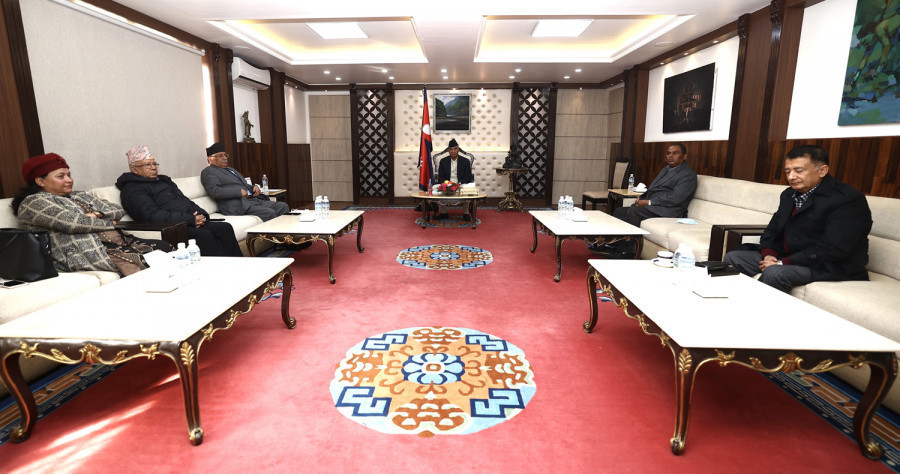National
Ruling coalition reaches understanding to hold elections on November 20
Some issues remain though including transitional justice act and seat-sharing, which leaders say will be sorted out.
Anil Giri
Amid speculations that elections could be postponed to February, the ruling coalition partners on Wednesday reached an understanding to hold the polls on November 20.
A leader participating in a meeting of the ruling coalition on Wednesday said that the partners have reached an understanding that elections would be held on November 20 and the next Cabinet meeting, most probably on Thursday or Friday, will take a decision to that effect.
On July 6, the Election Commission had recommended November 18 for general and provincial elections.
The delay in declaring the date stoked speculations if the coalition partners were planning to postpone it.
The Election Commission has long been saying that it needs 120 days to prepare for the elections. If elections are held on November 20, the commission will have 112 days for the preparations.
“That will be enough,” Dinesh Thapaliya, chief election commissioner, told the Post on Sunday.
In the Nepali Congress-led coalition, the CPN (Maoist Centre), the CPN (Unified Socialist), Janata Samajbadi Party and Rastriya Janamorcha are partners.
Durga Poudel, a leader from the Rastriya Janamorcha who was present at the meeting, told the Post that the understanding among the partners on holding elections on November 20 should end the speculations.
“The next Cabinet meeting will take a formal decision,” said Poudel.
The government was facing criticism for not declaring the election date even after the commission recommended a date.
As per the existing laws, the government announces election date(s) in consultation with the poll commission.
Some leaders within the alliance, particularly from the CPN (Maoist Center) and the CPN (Unified Socialist), were of the view that the elections could be postponed to February.
But the Election Commission said that since the last general election was held in November-December of 2017, it was not wise to defer it to February 2023.
Prime Minister Sher Bahadur Deuba has long been saying that elections would be held within November.
Deuba’s strategy, according to leaders familiar with the development, is not to delay the polls as it could give room to the communists to come together, which could be detrimental to his party—the Nepali Congress.
Even some leaders of the Nepali Congress wanted to defer the elections to February, but Deuba refused, said a central member of the Congress.
The ruling alliance partners face an uphill task of seat-sharing as the Congress wants to keep at least 100 constituencies, out of 165, where elections will be held under the directly elected system for the House of Representatives. Nepal’s lower house is 275-strong, and 110 members are elected under the proportional representation (PR) system. For seven provincial assemblies, 330 seats are up for grabs under the direct election system and 220 members will be elected under the PR system.
The Congress is under pressure as its coalition partners are demanding at least 80, out of 165 seats in the House, for them.
There’s yet another complication the government has to deal with. Confusion continues as to whether the House can function once the election date is announced.
The government has registered a bill to amend the Commission on Investigation of Disappeared Persons, Truth and Reconciliation Act 2014.
The incumbent government wants to get the bill through the House, but conflict victims and human rights activists have questioned some of its provisions, saying they are aimed at granting amnesty even for serious human rights violations.
Earlier, it was said that the government was waiting for the amendment bill on Citizenship Act to pass for announcing the election date. The bill has already gone through both the houses and is awaiting President’s approval.
Now, some say the government may have been waiting for the bill on transitional justice to get through.
“We are of the view that Parliament will continue even after the election date is announced,” said a Nepali Congress leader. “Once the bill on transitional justice gets through, its current term will end.”
Meanwhile on Wednesday, conflict victims met with Prime Minister Deuba and expressed their reservations about some of the provisions in the bill to amend the transitional justice act.
Suman Adhikari, whose father was killed by Maoists in 2014 , told the Post that the prime minister took note of the victims’ concerns and said that he would look into their reservations so as to address them.
Conflict victims are also worried that the government might bulldoze an Act through an ordinance if the House term ends without passing the bill, in a way that exonerates the perpetrators of serious human rights violations
Some legal and constitutional experts, however, say the House should not remain functional after the election date is announced.
Bipin Adhikari, the founding dean of the Kathmandu University School of Law, said that the House term should come to an end once the election is announced.
“Politically and morally… it is not ethical to have the House when the country is set to elect a new set of lawmakers,” Adhikari told the Post.
Ruling party leaders said another meeting of the coalition has been scheduled for Friday to discuss a host of issues, including the House term.
“The next meeting will discuss a wide range of issues—the House term, transitional justice act and seat-sharing, among others,” said Ram Chandra Poudel, a senior Congress leader who also heads a committee to guide the government.




 8.79°C Kathmandu
8.79°C Kathmandu















